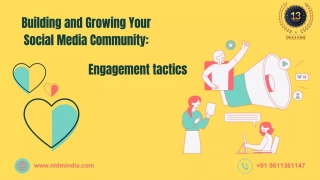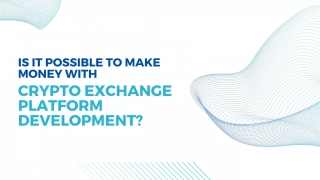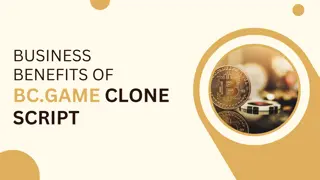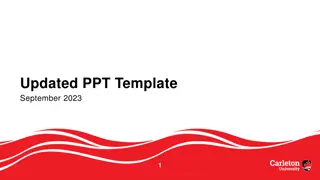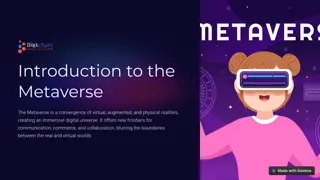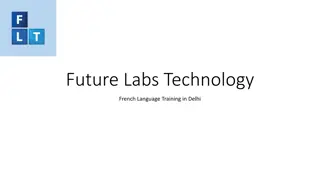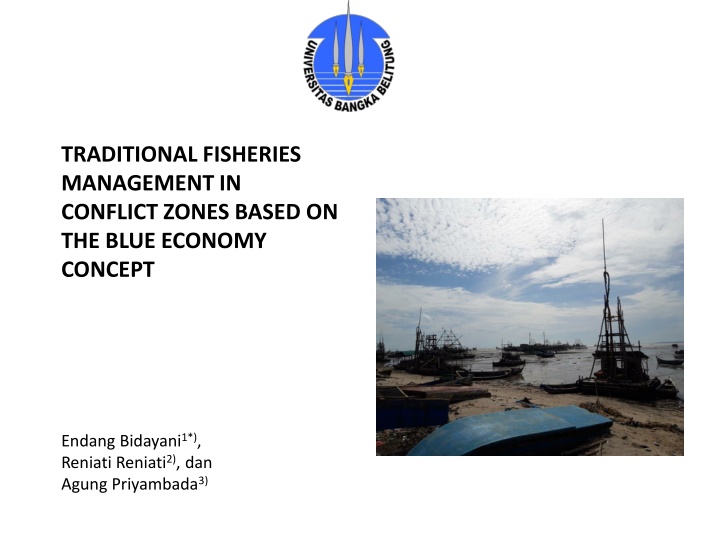
Fisheries Management in Conflict Zones Based on Blue Economy Concept
Explore how traditional fisheries management in conflict zones can benefit from the blue economy concept, focusing on the implementation of principles and sustainable resource management. The study delves into the efficiency, zero waste, and social aspects of traditional fishing practices, highlighting opportunities for economic growth and innovation.
Download Presentation

Please find below an Image/Link to download the presentation.
The content on the website is provided AS IS for your information and personal use only. It may not be sold, licensed, or shared on other websites without obtaining consent from the author. If you encounter any issues during the download, it is possible that the publisher has removed the file from their server.
You are allowed to download the files provided on this website for personal or commercial use, subject to the condition that they are used lawfully. All files are the property of their respective owners.
The content on the website is provided AS IS for your information and personal use only. It may not be sold, licensed, or shared on other websites without obtaining consent from the author.
E N D
Presentation Transcript
TRADITIONAL FISHERIES MANAGEMENT IN CONFLICT ZONES BASED ON THE BLUE ECONOMY CONCEPT Endang Bidayani1*), Reniati Reniati2), dan Agung Priyambada3)
Introduction Blue economy is an environmentally friendly management concept sustainability of fish resources. This is considered effective in minimizing conflicts of interest in coastal areas. One of the conflict zones in the Province of the Bangka Belitung Islands is located on the coast of Kebintik Village and Batu Belubang Village, Pangkalan Baru District, Central Bangka Regency. to ensure the
For this reason, this research will focus on: 1) Analysis of the implementation of blue economy principles; and 2) Analysis of traditional capture fisheries management in conflict zones for sustainable fish resources.
Research Method This research method is a survey method. The research was conducted in June July 2022. The research method was a survey. Data collection using census techniques and focus group discussions. The population in this study are traditional fishermen who have operated for more than one year in coastal areas as many as 30 people, and 30 people affected by the community. Data collection methods in this study include primary data and secondary data. Primary data collection using a questionnaire, documentation. Secondary data collection through literature study. The data analysis method used is descriptive method. observation and
RESULT AND DISCUSSION The blue economy principles studied include resource efficiency, zero waste, social care, production cycle systems, investment, innovation and adaptation. The fishing effort of traditional fishermen in the abundant season, all respondents (100%) are efficient. Meanwhile, in the famine season, 57% of fishermen break even (R/C = 1), 33% (R/C <1 ) are inefficient, and 10% (R/C > 1) are efficient. The results of this study are in line with the research of Nainggolan et al. (2021), that the income of traditional fishermen in the fishing season is around Rp. 65,000/day or Rp. 980,000/month. Meanwhile, in the famine season, the income of traditional fishermen is Rp. 13,000/day or 205,000/month.
Study of the Zero Waste principle, the catch of traditional fishermen as a whole can provide economic benefits. As many as 86.67% of fishermen stated that their catch provided economic benefits (soldable), while 13.33% of fishermen stated that the fish that were not sold were usually consumed by themselves. To increase income, fishermen can process fresh fish into various kinds of processed products. This opinion is reinforced by Nainggolan et al. (2021), the government can provide fish processing training to fishermen to increase added value.
The production cycle system means that the capture fisheries business can continue continuously. As many as 90% of fishermen can still carry out fishing activities by changing locations. reinforced by the opinion of Bidayani (2021), in conflict zones, fishermen find it difficult to get fish, so fishermen locations. traditional This is change
The willingness of traditional fishermen to invest in business, innovate to increase productivity and be able to adapt in conflict zones. All fishermen (100%) are willing to invest in business by increasing the number of fishing gear, and adding bait variations to increase productivity as a form of adaptation in conflict zones. According to Nainggolan et al. (2021), the government can provide financial support for the procurement of fishing facilities and infrastructure.
Analysis of traditional capture fisheries management in conflict zones for sustainable fish resources based on the blue economy concept includes village government policies related to activities approaches used in case of conflicts of interest in coastal areas, efforts made to create peace in the community, appropriate empowerment programs to help fishermen, and stakeholder expectations for sustainable fish resources. in coastal areas,
The policies of the Batu Belubang Village Government related to activities in coastal areas, especially for fishermen, include: Increasing the capacity of Human Resources, providing facilities and infrastructure such as cold storage, fishing gear assistance, counseling, good fishing training, additional facilities at Fish Auction Places, and assistance pier extension. Meanwhile, policies for tin miners include: setting up mining zones, encouraging licensed tin mining, prohibiting mining in fishing areas, and controlling illegal tin mining activities. The strategy to increase fishermen's income according to Nainggolan et al (2021), is an aggressive strategy including the formation of fishing groups and the use of modern fishing gear.
The approach used if there is a conflict of interest in the coastal area is deliberation. Efforts made to create peace in the community are setting operational areas, not interfering between tin miners and fishermen, and compensation from mining actors in fishing areas. According to Bidayani (2019), methods that can be used to manage conflict include compromise. empowerment programs to assist fishermen include training and mentoring of fishermen and fish processors, as well as facilitating the needs of fishermen. Stakeholders hope that fish resources are sustainable, including setting up marine space utilization zones, using environmentally friendly fishing gear, and maintaining the cleanliness of the marine environment. According to Nainggolan (2021), the government routinely conducts outreach, training for fishermen to process fish and how to preserve sustainable marine and coastal resources. Appropriate
Conclusion and Suggestion The conclusions of this study are: 1) The implementation of blue economy principles includes resource efficiency, zero waste, social care, production cycle systems, investment, innovation and adaptation ranging from 86% - 100% or high category; and 2) Traditional capture fisheries management in conflict zones for sustainable fish resources is a compromise. Suggestions from the research are: setting up marine space utilization zones, using environmentally friendly fishing gear, and fishermen empowerment programs to increase income
ACKNOWLEDGEMENT The authors would like to thank the entire community and the Government of Batu Belubang Village, Pangkalan Baru District, Central Bangka Regency as research respondents, and the Research and Community Service Institute (LPPM) of the University of Bangka Belitung for funding research through the Higher Education Excellence Research grant scheme.





